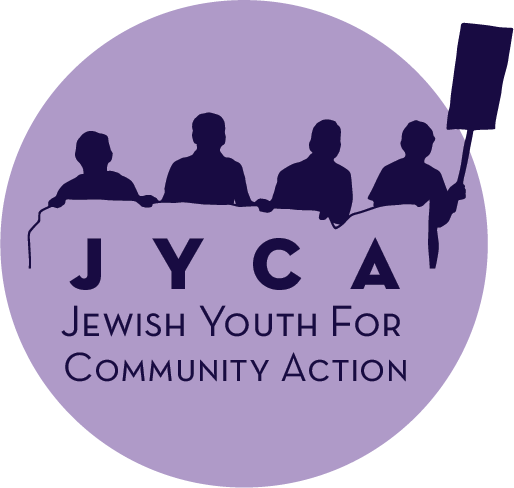I can only imagine what you, as a parent of Jewish youth, must be holding right now. This is a devastating moment in which fear, grief, rage, and heartbreak are shared among everyone—regardless of perspective, stance, or belief. At JYCA, we emphasize the importance of care, compassion, and connection. These are the things we always have and can choose when it seems all else has failed.
We have been asked by many parents and community members, “How do I hold my teen right now? How can I empower them to use their voice? I feel at a loss for words and direction.” Luckily, this is what JYCA does: empower youth and provide the tools necessary to navigate a seemingly broken world. We understand the responsibility we have to repair it and make sure no one is left behind, because all life is sacred. Right now, each of us are called to be brave and honest. Olam Ha’ba depends on it.
1) How to guide your teen through this:
First and foremost, it is important to hold space for anything that they are feeling: rage, grief, fear, confusion, etc. Invite your youth to scan their bodies to identify where they're feeling each emotion, then co-regulate as needed before doing a deeper check-in.
Pro tip: youth love fidget toys, tiger balm or essential oils, and breathing exercises!
Ground yourself first then your teen in the understanding that you may not know what may happen next and, regardless, you will be there.
It is important to make space for their questions and encourage curiosity about what is happening. It's okay if you do not have the answers to their questions. At a time where humanity seems to be absent, compassion for oneself and each other is needed to move through this moment. Curiosity cultivates compassion.
When gathering resources to stay informed about what is happening and be prepared to answer questions, ask yourself if the article(s) you are reading honors the humanity of everyone involved. If not, then it’s best not to use it.
As I am sure you know, no one can tell a teen (or anyone) what to think. Therefore, teaching them how to think is key. Get clear on the values you are leading with.
Some of JYCA’s top values: center anti-racism in decision-making, multiple things can be true at the same time, no one is disposable, and we take care of each other.
2) How can youth effectively use their voice, regardless of where they stand politically:
First, it is important to ground voices in values before politics. Israel/Palestine is a highly contentious political topic—and Jewish values hold great wisdom that can offer guidance. Invite youth into the questions of: 1) what point am I trying to make, 2) what nuance am I offering, and 3) what values is my perspective grounded in?
General rule of thumb: address ideas, not people. It is not "me versus you," rather "us versus the problem." In this case, people's perspectives of the problem may differ so inviting youth into identifying/naming the problem they are addressing can serve as a depersonalized point from which to build.
It is important that youth use their voices from a holistically informed place to be prepared for questions and/or push back they might receive as well as understand how their own perspectives are developed. It is important to remember that putting one's voice forward will inherently invite discussion. Something so sacred about Judaism, I think, is machloket. No one is guaranteed not receiving push back and/or not experiencing discomfort—and everyone is entitled to their own agency and ability to stop engaging in conversation when they feel it is unproductive and/or unfairly adversarial. There is always room for boundaries.
Another thing youth are always able to do is ask someone what they mean by something. Make room for reconciliation rather than further hurt.
And, in a space where discussion happens and multiple perspectives exist, everyone should prepare to not find closure. This moment requires everyone to sit in discomfort and our job as adults is to model for youth how that can look. This work is ongoing. Keep having the hard conversations.
3) How to thoughtfully use one's voice:
Lead with what one's intentions, goals, and boundaries are.
There are many ways to express one's voice! Youth can create art about this, write poetry (poetry is a political act), or write op-eds for magazines/blogs/etc.
Using one’s voice does not have to be a public act. Indeed, some perspectives right now are targeted and systematically censored. Youth having an outlet to share authentically is the most important thing, even if that means sharing privately. For parents: be prepared to listen.
Extra note on thoughtful ways to use one’s voice: do not use language that enables violence against anyone.
At JYCA, we are focused on taking care of our youth. We are dedicated to Jewish safety, collective justice, and urgent solidarity. If your youth has experienced or is experiencing anything that has jeopardized their safety, please let us know and we will offer support.
With love and care,
Geo Kanegawa (they/he)
Interim Executive Director at JYCA

